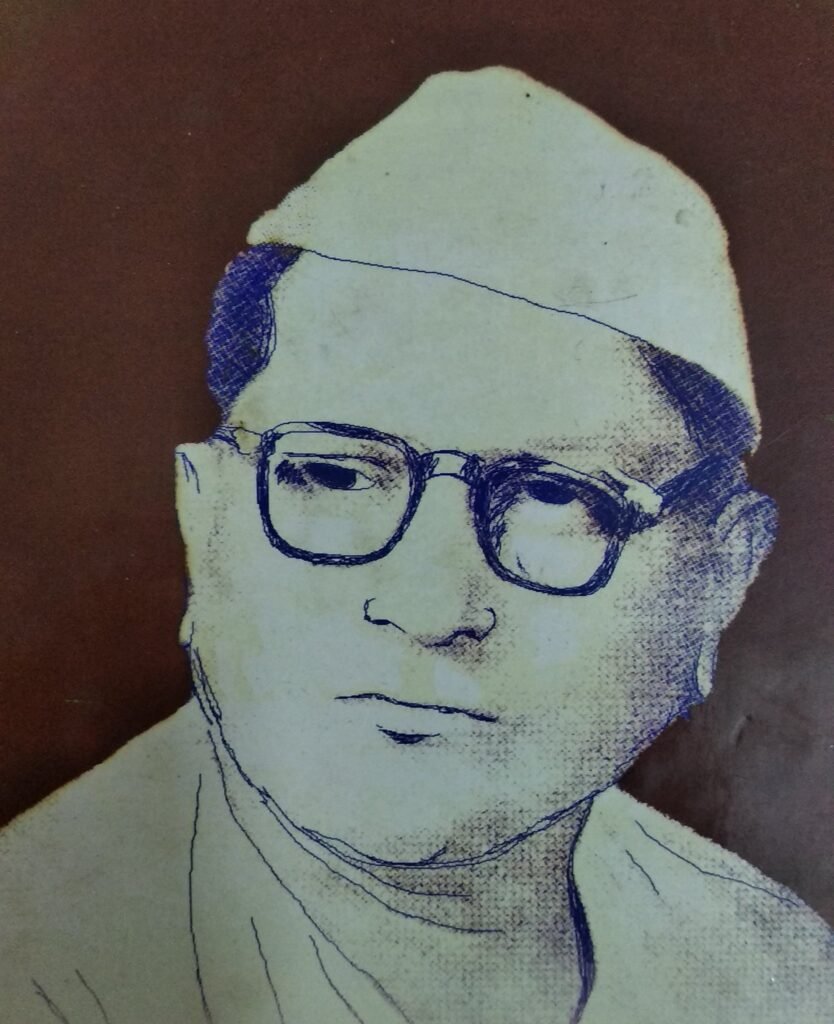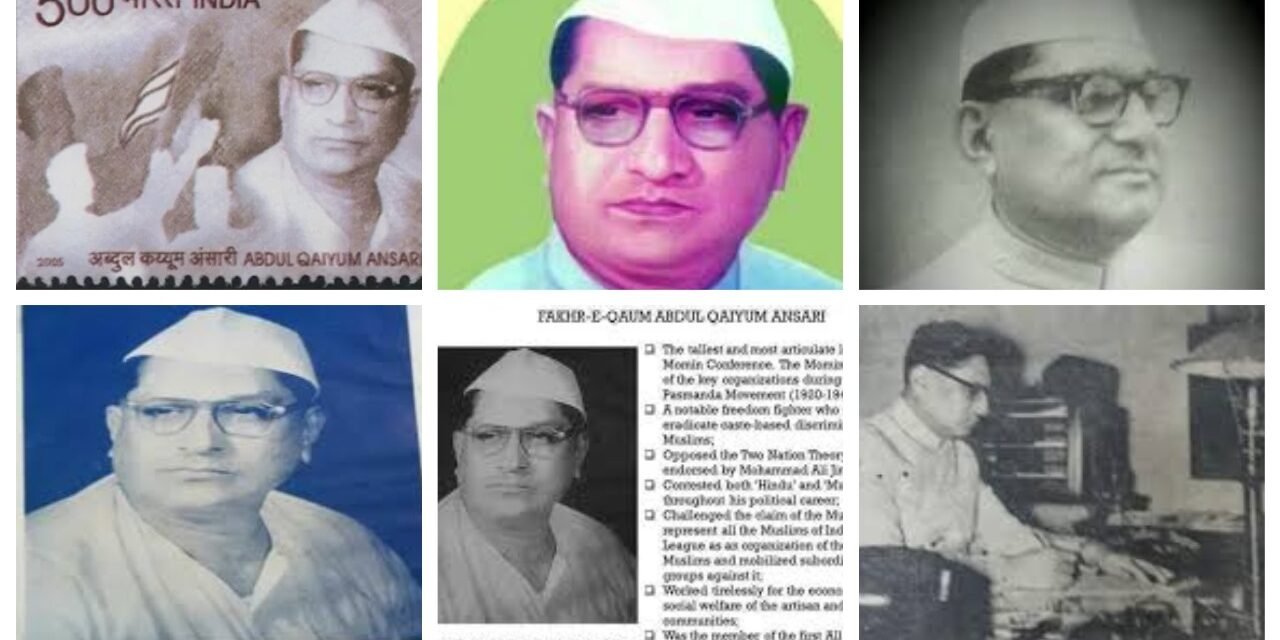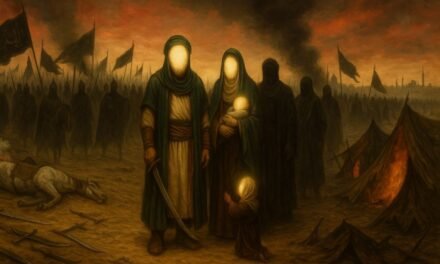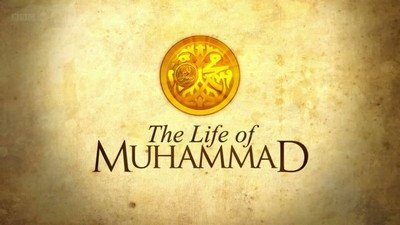~SHAHNAWAZ AHMAD ANSARI
In the annals of India’s freedom struggle, many names shine brightly, but some heroes remain in the shadows, their contributions overlooked and their sacrifices forgotten. One such unsung hero is Abdul Qayyum Ansari: a die-hard patriot, a relentless fighter for equality, a messiah for the marginalized, and a staunch opponent of Jinnah’s two-nation theory. Despite his immense contributions to India’s fabric before and after independence, his name is rarely mentioned alongside the pantheon of great Indian leaders.
As the sun rises on July 1st, marking his birth anniversary, it is imperative to remember Abdul Qayyum Ansari, born in 1905, a forgotten hero whose indomitable spirit and relentless efforts shaped India’s struggle for freedom and equality. His monumental contributions and untiring advocacy for national integration, secularism, and social justice underline his undeniable merit for India’s highest civilian honour, the Bharat Ratna. As we commemorate his birth anniversary, it is crucial to recount his legacy and revive the collective memory of a nation indebted to his profound impact.
ANSARI: A forgotten hero – Giant among giants
Abdul Qayyum Ansari’s life story is one of unwavering commitment to India’s unity and integrity. Born in Dehri-on-Sone, Bihar, Ansari’s early life was marked by a profound sense of justice and equality. He was deeply involved in the Khilafat and Non-Cooperation Movements, inspired by leaders like the Ali Brothers. At the tender age of 16, he was imprisoned for his participation in these movements, marking the beginning of a lifelong struggle against oppression and inequality.
With his comprehensive contributions to India’s socio-political landscape, Ansari deserves to be remembered and honoured. He fought against colonial rule and championed the cause of social parity. Despite his monumental efforts, Ansari’s name is seldom mentioned in the gallery of Indian freedom fighters. It is overbearing that we correct this historical oversight and celebrate his sacrifices and achievements.

ANSARI: Real patriot (‘desh bhakt’)
Ansari epitomised desh bhakti (patriotism) as a visionary leader who opposed the division of India based on religion. Foreseeing the dangers of communalism, he vehemently opposed the divisive Two-Nation Theory proposed by Muhammad Ali Jinnah and the Muslim League. His resistance to partition exemplified his unwavering loyalty to a united, secular, and inclusive India. As a youth, he joined the Khilafat Movement and later the Indian National Congress, dedicating his life to the country’s freedom struggle.
Ansari believed that partition would serve only the privileged few. As the leader of the Momin Conference, he actively opposed Pakistan’s creation and countered the communal policies of the Muslim League. His assertion that the division would benefit wealthy capitalists, landlords, and aristocrats while causing immense suffering to common people proved prophetic.
Abdul Qayyum Ansari’s patriotism was unparalleled. His opposition to the two-nation theory was rooted in his belief that India was a land for all, irrespective of caste, creed, or religion. He tirelessly promoted communal harmony and national integration, envisioning a united India where people of all backgrounds could coexist peacefully.
Ansari’s unique patriotism was evident during Pakistan’s aggression on Kashmir in October 1947 when he emerged as the first Muslim leader to condemn the invasion. He mobilised Muslim masses in support of the Indian government, forming the Indian Muslim Youth Kashmir Front in 1957 to liberate occupied Kashmir. His unwavering support for the Indian government during the anti-Indian uprising of the Razakars in Hyderabad further solidified his image as a true patriot.
ANSARI: Messiah for social justice and the marginalised
Ansari’s contributions extended beyond the freedom struggle, as he dedicated himself to social justice and uplifting the backward and Dalit communities. He was a vocal advocate for their rights, working through the Momin Movement to promote their social, political, and economic advancement. As a true champion of social equality, Ansari tirelessly fought against the entrenched caste system among Indian Muslims. His efforts challenged the dominance of the Savarna-Ashraf Muslims and mobilised subordinated Muslim caste groups against communalism. He recognised the deep-rooted caste system within Muslim communities and championed the Pasmanda Muslims – the most disadvantaged social group within the Muslim population.
Ansari was instrumental in mobilising the Pasmanda Muslim community, which constituted over 70% of India’s Muslim population. He was a man of action, spearheading initiatives to promote education and literacy among the underprivileged. His efforts led to the establishment of various institutions and organisations dedicated to improving the lives of the marginalised. He was crucial in establishing the first All India Backward Classes Commission, addressing issues facing backward communities.
His advocacy for the inclusion of backward classes in government policies and programmes was groundbreaking. His dedication to public service is exemplified by his 17-year tenure as a minister in the Bihar government, where he tirelessly worked to improve the lives of the marginalised. As the tallest leader of the All India Momin Conference and the Pasmanda movement, Ansari’s astute leadership transformed the Momin Conference into a powerful political force that opposed both Hindu and Muslim communalism. His unwavering commitment to social justice and equality made him a revered figure among the backward and Dalit communities.
ANSARI deserves ‘Bharat Ratna’

Abdul Qayyum Ansari’s contributions to India’s freedom struggle are unparalleled. His brand of patriotism transcended caste and creed, driven by a strong vision for India’s sovereignty and integrity. His relentless fight for social justice and equality further underlines his deserving candidacy for the ‘Bharat Ratna.’ Below are compelling reasons for honouring him with this prestigious award:
- Die-hard Opponent of Two-Nation Theory: Ansari’s staunch opposition to Jinnah’s two-nation theory and countering the Muslim League’s communal policies were pivotal in preserving India’s unity.
- Freedom Fighter: Participated in the Khilafat and Non-Cooperation Movements, imprisoned young for activism.
- Champion of National Integration: Unwavering commitment to national integration, secularism, and communal harmony.
- First Muslim Leader to Condemn Pakistan’s Aggression: First to condemn Pakistan’s aggression on Kashmir and the Hyderabadi Razakars, mobilising Indian Muslims for the Indian government.
- Champion of Social Justice: Worked tirelessly for the economic, educational, and social welfare of the backward and Dalit communities.
- Education Crusader: Founded schools, edited magazines, served on university boards, and boycotted British institutions for indigenous education.
- Youth Leadership: Inspired many young Indians to join the freedom struggle.
- Leader of the Underdogs: Championed the cause of Pasmanda Muslims, a marginalised community.
- Journalistic Contributions: Used journalism to advocate for equality and justice, shaping public opinion as editor of “Al-Islah” and “Musawat.”
- Political Activism: Assertive politics in the 1930s and 1940s challenged both Hindu and Muslim communalism.
- Advocacy for Backward Classes: Instrumental in shaping policies for social justice through the All India Backward Classes Commission.
- Champion of Secularism: Actively fought communal forces, promoting unity and harmony, embodying ideals of secularism, equality, and justice.
- Opposition to Communalism: Consistently opposed both Hindu and Muslim communalism, advocating for a secular and inclusive India.
- Leadership in Bihar: Served 17 years in Bihar Cabinet, focusing on backward communities’ welfare, showcasing administrative acumen.
- Economic Emancipation: Promoted economic welfare of artisans and backward communities, especially in the handloom sector.
- Posthumous Recognition: The Indian government issued a postage stamp in his honour in 2005, yet his contributions warrant greater recognition.
Key takeaways from Ansari’s life and legacy
Abdul Qayyum Ansari’s life exemplified patriotism, social justice, and communal harmony. His contributions to India’s freedom struggle, his fight against communalism, and his dedication to uplifting the backward and Dalit communities make him a true hero. We must recognize his deserving place in India’s history on his birth anniversary. It is time the nation acknowledges his contributions by bestowing upon him the Bharat Ratna, honouring his legacy, and inspiring future generations to uphold the values he championed.
Ansari’s story is not just a chapter in India’s history but a lesson in courage, commitment, and compassion. Celebrating his life and legacy, let us pledge to continue his fight for a just, equal, and inclusive India. Bestowing the Bharat Ratna on this forgotten hero would be a fitting tribute to his legacy and a powerful message to all Indians.
About the Author:
Shahnawaz Ahmad Ansari is a thinker, accomplished author, journalist, and editor with over two decades of experience. A published poet, his reflective and philosophical poems can be found at https://mypoeticside.com/show-poem-170364. He crafts insightful editorials, eloquently expressing his keen observations of socio-economic issues through his blog https://candidqalam.home.blog/. He is also a critical socio-economic and literary commentator.
Contact Details:
Email: saasiwan@gmail.com





